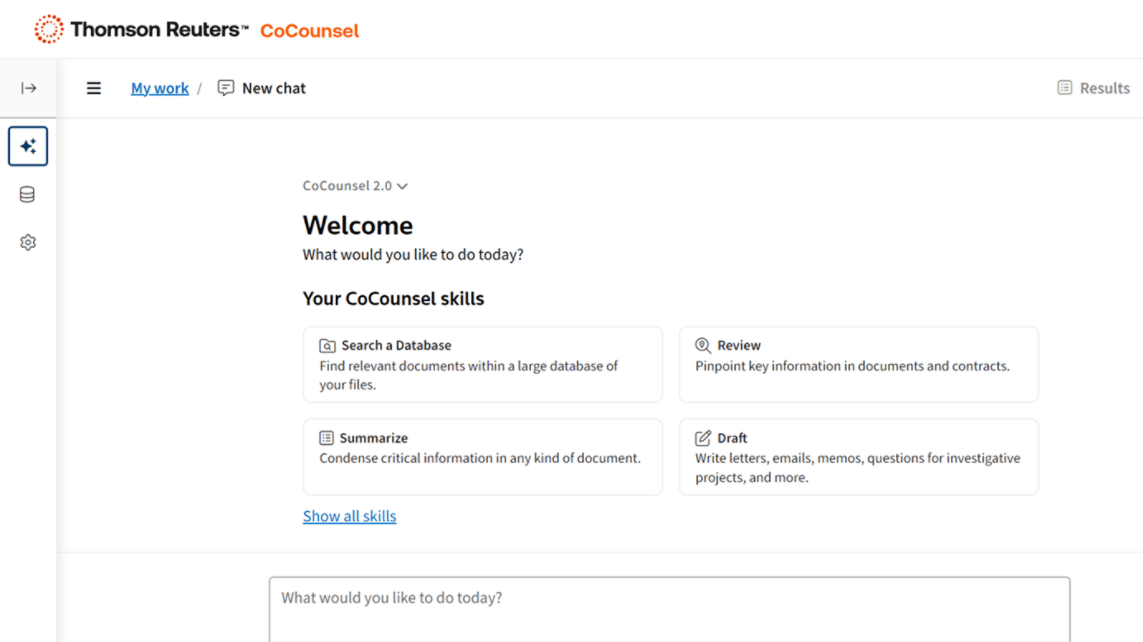Embracing AI technology can grow your practice
AI has the capacity to make life better, faster, funnier (and scarier). Whether you view it as a threat or an opportunity, AI is here to stay. In the legal realm, AI technology has begun transforming the work environment and the lives of lawyers. Let’s explore how law firms are using AI to take on more business.

CoCounsel
Bringing together generative AI, trusted content and expert insights
Meet your AI assistant ↗Jump to ↓
| How many law firms are using AI? |
| Why is AI good for law firms? |
| How can AI be used to generate more business for law firms? |
| Are law firms using AI to take on more business? |
How many law firms are using AI?
Virtually all law firms utilize some form of artificial intelligence. AI is baked into legal platforms like Westlaw and Practical Law, which have been around for years. What’s new is the use of generative AI, a type of artificial intelligence that creates, or “generates,” content such as text, graphics, and documents. There are significantly fewer firms actively using this type of AI, at least for now.
According to a 2023 Thomson Reuters Institute report titled, ChatGPT and Generative AI within Law Firms, “just 3% of respondents said they are already using generative AI or ChatGPT for law firm operations, and an additional 2% said they are actively planning for its use. About one-third of respondents (34%) are still in the consideration phase for generative AI and ChatGPT, while 60% answered they have no current plans for generative AI use in firm operations.”
Why is AI good for law firms?
Efficiency
No surprise, the biggest advantage of AI in a law firm is speed. In a world that counts every 6-minute increment, legal work that would once take hours or days can be done in seconds with AI. Time-consuming, but critical tasks such as research, document drafting and review, and data entry can now be done in a fraction of the time of pre-artificial intelligence. By automating routine tasks, you can dedicate more time to higher-level, strategic work that directly serves your clients.
Deeper Insights
Better efficiency means you can dig deeper. AI can search its digital data warehouse to provide hard-to-find information and predict legal outcomes. Products like Practical Law’s Dynamic Tool Set with CoCounsel can help provide insight faster with visualization tools and data-driven charts so you can easily interpret information and then share it with clients, colleagues, and outside counsel.

A review of Practical Law Dynamic Tool Set with CoCounsel
See why this CEO & Senior Counsel believes Practical Law is the best tool for lawyers and legal departments on the market today.
Read article ↗Consistent work product
Legal work is complex. AI tools can help you develop best practices across your firm with predictive workflows to guide your teams.
How can AI be used to generate more business for law firms?
Capacity
The simple math is that when AI takes routine tasks off your plate, you have more time for business development. As important as it is, finding new clients often takes a back seat to serving the current ones. Dedicating time to both will help build your practice.
Responsiveness
Most people seeking legal help need it now. And they often choose the law firm that responds the fastest. By implementing an AI chatbot on your website, you can respond immediately to common client queries and help generate new business leads by capturing visitor information. It can also analyze client data to suggest personalized follow-up or cross-selling other legal services.
Marketing and content generation
“AI can generate content through machine learning algorithms that analyze and learn from vast datasets of existing text, images, or other media, allowing it to generate new content based on patterns and information it has acquired.” AI wrote the previous sentence based on a directed prompt. While it’s not exactly poetic, it could be edited into understandable, engaging content. The same can work for lawyers. AI can assist in generating high-quality legal content for blogs, newsletters, social media, or podcasts that you can review, edit, and publish. That can help establish you as a thought leader and attract new clients.
Market analysis and competitive intelligence
If you’re looking to expand your practice, AI can analyze market trends and the competitive landscape to identify new practice areas or niches. Products like What’s Market provide a database of summaries for publicly filed deals that allows you to analyze and compare terms or features. You can see where new opportunities lie ahead.
Are law firms using AI to take on more business?
Most attorneys are approaching it carefully, as is part of their nature to protect their clients. You shouldn’t let AI generate any work product without a robust review. But once you try it, notes Charlotte Woolven-Brown, a partner at U.K. law firm Sternberg Reed, the results are convincing. It becomes part of the daily routine. “People will get more in tune with what’s happening and how quickly this technology is developing. I couldn’t go back. I use it every day.”

AI news and insights
Industry-leading insights, updates, and all things AI @ Thomson Reuters
Join community ↗









